
Biologically speaking, hybridization is defined as the breeding of two organisms from different species. This process creates a hybrid, an organism that’s a genetic mix of two different species.
There are countless examples of hybrids in both the wild and captivity. A study from University College London suggested that up to 25 percent of plant species and 10 percent of animal species are involved in hybridization and introgression with other species.
Examples of hybrid animals
As one example, there are pizzly bears, hybrids born as a result of inter-species romping between a grizzly bear (Ursus arctos horribilis) and a polar bear (Ursus maritimus). These hybrid bears have become increasingly common in the North American wilderness due to climate change meddling with the bears’ natural range.
Another example is the Narluga, a half-narwhal half-beluga. Scientists identified this hybrid for the first time in 2019 when they studied an unusual whale skull found on the roof of an Inuit toolshed in West Greenland’s Disko Bay. Analysis of its DNA showed that the individual’s mother was a narwhal and its father was a beluga.
Occasionally, hybrids are actively created by humans. For instance, farmers have interbred domestic pigs (Sus scrofa domesticus) with Eurasian wild boar (Sus scrofa scrofa) with the aim of creating an animal that resembles the early pigs that were first domesticated by humans in ancient times.
There have also been examples where hybridization has occurred in captivity by accident. In 1978, a hybrid elephant called “Motty” was born at Chester Zoo in the UK, which had an African elephant (Loxodonta africana) for a father and an Asian elephant (Elephas maximus) for a mother. Such a hybrid would never occur naturally because the two elephant species are separated by vast geographical distances in natural ranges on two different continents that do not connect.
Even modern humans are the product of hybridization. Throughout our long history as a species, we have prolifically interbred with Neanderthals, a similar yet different species of hominin. The legacy of that canoodling still lives on today, with up to 3 percent of DNA in modern Europeans and East Asians coming from Neanderthals.
How does hybridization work?
You might have been taught at school that two different species cannot interbreed and create fertile offspring, but that’s not always the case.
It’s true in many scenarios: horses and donkeys can interbreed to create hybrid offspring, known as mules, but they will be infertile and unable to reproduce themselves.
In other scenarios, however, animals of different species can interbreed and create fertile offspring. This is typically a case of chromosomal compatibility. Dogs, wolves, coyotes, and jackals are different species, but they all possess 78 chromosomes arranged in 39 pairs, allowing them to successfully interbreed with fewer hitches.
Species must be closely related for hybridization to occur. You won’t have much luck trying to interbreed turtles with turtle doves because the two species are from vastly different branches of the evolutionary tree.
Interspecific hybrids a typically created through interbreeding of two different species from within the same genus, a taxonomic category ranking used in biological classification that is above species but below family.
There are always exceptions to the rule, though. For example, Motty the elephant’s parents were each technically from a different genus, Loxodonta and Elephas.
Source Link: Hybridization: The Potent Evolutionary Process That Shakes Up Species